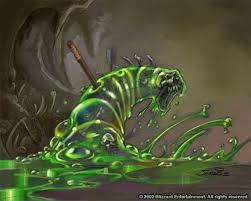记忆方法
【污渍(拼音:zi)】渗出物是污渍
中文词源
ooze 涌出,渗出
来自古英语wase,软泥,泥沼,来自Proto-Germanic*waison,来自PIE*weis,黏滑,流出,词源同virus,viscid,viscous.
英语词源
- ooze (v.)
- late 14c., wosen, verbal derivative of Old English noun wos "juice, sap," from Proto-Germanic *wosan (source of Middle Low German wose "scum"), from same source as ooze (n.). Modern spelling from late 1500s. The Old English verb was wesan. Related: Oozed; oozing.
- ooze (n.)
- "soft mud," Old English wase "soft mud, mire," from Proto-Germanic *waison (cognates: Old Saxon waso "wet ground, mire," Old Norse veisa "pond of stagnant water"), from PIE *wes- (2) "wet." Modern spelling is mid-1500s.
权威例句
- 1. He grabbed into the ooze and came up clutching a large toad.
- 他把手伸进淤泥里捞摸,结果抓上来一只巨大的蟾蜍。
- 2. The wounds may heal cleanly or they may ooze a clear liquid.
- 这些伤口可能会利索地愈合,也可能会分泌出一种透明的液体。
- 3. Outwardly, Graham will ooze all his old confidence.
- 格雷厄姆表面上看起来会像过去一样满怀信心。
- 4. The lava will just ooze gently out of the crater.
- 岩浆就会从火山口缓缓涌流出来。
- 5. Drip or ooze systems are common for pot watering.
- 滴灌和渗灌系统一般也用于盆栽灌水.

